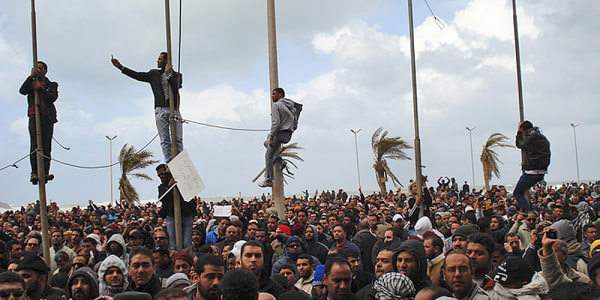Misrata continued to come under bombardment from Libyan government troops late Saturday despite claims that forces loyal to Moammar Gadhafi had fled the rebel-held city.
Gadhafi forces had appeared to suffer a significant setback hastened by NATO air strikes, but bursts of automatic weapons fire could be heard as several rounds of Grad rockets exploded in the city, rights groups and media reported.
Deputy Foreign Minister Khaled Kaim said at a capital news conference Saturday that the army had suspended operations against rebels in Misrata, but had not left the city, French news agency AFP reported.
"The tribes are determined to solve the problem within 48 hours," he said.
Misrata, the last large city held by rebels in western Libya, had been under a punishing government siege for nearly two months and hundreds of civilians have died in the fighting.
"We have been told to withdraw. We were told to withdraw yesterday," a government soldier captured by rebels, Khaled Dorman, told Reuters on Saturday from the back of a pickup truck.
He was among 12 wounded soldiers brought by rebels to hospital in Misrata, 200 km east of Tripoli. Blasts and machinegun fire could be heard in the distance.
Another serviceman, asked by a Reuters correspondent if the government had lost control of Misrata, said "yes."
Rebel spokesman Gemal Salem later told Reuters by telephone from Misrata that Gadhafi's forces had left the city but remained outside and would still be in a position to bombard it.
"Misrata is free, the rebels have won. Of Gadhafi's forces, some are killed and others are running away," he said.
The overall trend of fighting in Libya was far from clear. Al Jazeera television reported that heavy fighting continued around a hospital in western Misrata being used as a base by Gadhafi's forces.
And government forces captured the town of Yafran in Libya's Western Mountains on Saturday, a rebel spokesman said.
The conflict in the Western Mountains has received little international attention. Rebels there captured a border post two days ago and had begun been rushing supplies to towns under attack, saying they were cheered by reports from Misrata.
The Libyan government said late on Friday that NATO air strikes had taken their toll on its forces.
"The tactic of the Libyan army is to have a surgical solution, but it doesn't work, with the air strikes it doesn't work," Kaim had said Friday.
U.S. launches drone strike
Washington launched its first Predator drone strike on Saturday, the U.S. Defense Department said. NATO later said the target had been a multiple rocket launcher which had been used against civilians in Misrata.
A British military spokesman said British warplanes had destroyed government armored vehicles near Misrata and in other areas of Libya in recent days.
A rebel spokesman in Misrata, Abdelsalam, said pro-Gadhafi tribes were in a minority in the area:
"There are two small pro-Gadhafi settlements outside Misrata. They make up less than 1 percent of the population of Misrata and the surrounding area."
"Those people know that when Gadhafi's regime falls, they will fall with it," he added, predicting the government would boost their strength by paying mercenaries to pose as tribesmen.
Rebel spokesman Salem said rebels were now combing Misrata and clearing the streets. Before leaving, he said, Gadhafi's forces had booby-trapped bodies, houses and cars.
"One man was opening his fridge when he went to his house after the Gadhafi forces left it this morning and it blew up in his face. Bodies the same. When the rebels are trying to lift a body it blows up," he said.
A rebel spokesman told Al Jazeera television at least 15 people had been killed by booby-traps and ambushes and 31 wounded.
Russian Foreign Minister Sergei Lavrov told Libyan Prime Minister Al-Baghdadi Al-Mahmoudi on Saturday that Moscow could send observers to monitor a ceasefire and pave the way for a peaceful solution, Libya's official JANA news agency said. Greek Prime Minister George Papandreou also spoke with Mahmoudi.
Libyan Foreign Minister Abdelati Obeidi was reported by Tunisian news agency TAP to be in Tunisia on Saturday evening.
Western countries, which began U.N.-mandated air strikes last month to protect civilians from Gadhafi's forces, have vowed not to stop bombing Libya until he leaves power.
Slideshow 81 photos
Libya's uprising against Gadhafi
Analysts said the use of drones would be a psychological boost for the rebels but would not tip the balance in a conflict which the top U.S. military officer said on Friday was nearing a stalemate.
NATO bombs struck what appeared to be a bunker near Gadhafi's Bab al-Aziziyah compound in central Tripoli.
Government spokesman Mussa Ibrahim said three people had been killed by the "very powerful explosion" in a car park.
Reuters journalists said the area was surrounded by a wall and guarded by watchtowers and soldiers. They saw two large holes where the bombs had torn through soil and reinforced concrete, to pierce what appeared to be an underground bunker.
Smoke was rising from one of the craters and ammunition crates lay nearby. Ibrahim said the area was disused and the ammunition boxes were empty.
NATO said it had conducted 59 strike sorties on Friday and hit two command and control bunkers in the capital as well as three tanks, one bunker and other targets near Misrata.
Reports of refugee children sexually assaulted
British charity Save The Children said children as young as eight being cared for in refugee camps had reported being sexually assaulted by fighters during the conflict. The charity could not say which side they came from.
Rebels' elation at the breaking of the siege of Misrata was tempered by distrust of Tripoli. "I don't believe Gadhafi at all," said Osama al-Misrati, 41, as he took his wife and children by ferry from Misrata to the safety of Benghazi.
"If he really does withdraw it's for a tactical reason only. We have to win this."
